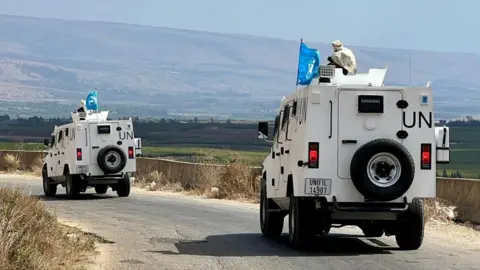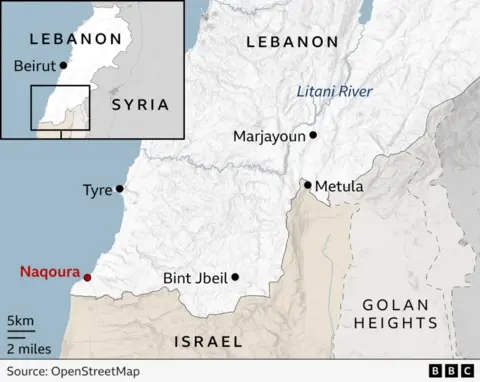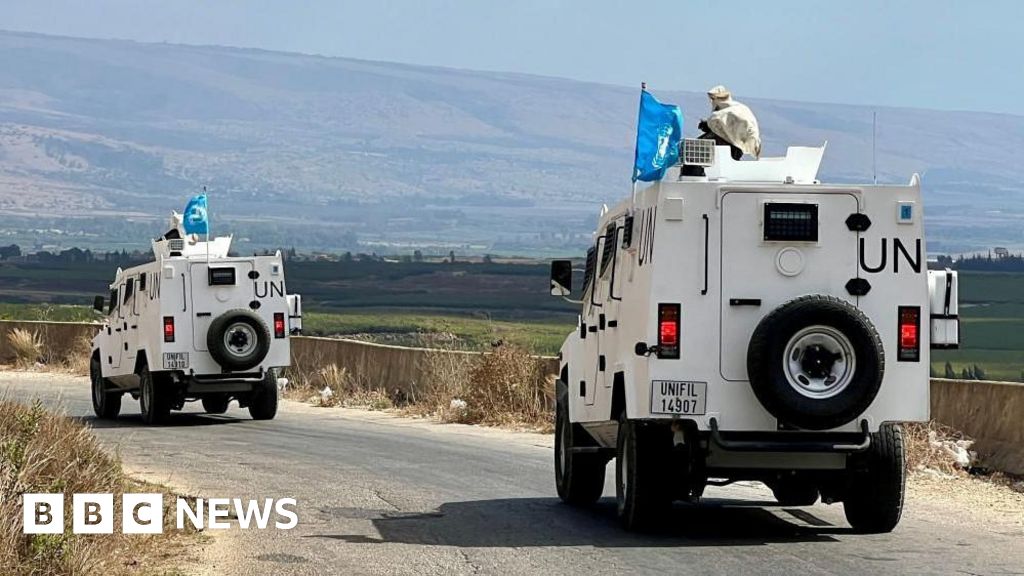 EPA-EFE/REX/Shutterstock
EPA-EFE/REX/ShutterstockTwo Indonesian peacekeepers have been injured after an Israeli tank fired at a watchtower in southern Lebanon, the UN says.
An observation tower at a UN base in Naqoura was directly hit, causing the peacekeepers to fall, the United Nations Interim Force in Lebanon (Unifil) said in a statement.
The UN said Israeli forces had “repeatedly hit” UN positions in the last 24 hours. Israeli soldiers are also accused of deliberately shooting at the cameras and lights at two other Unifil bases.
The IDF has not commented on the incident.
Both peacekeepers were not seriously injured but remain in hospital, according to the UN, which added that deliberate attacks on its peacekeepers were a “grave violation of international law”.
Unifil is a UN peacekeeping mission created in 1978, monitoring hostilities and helping to ensure humanitarian access to civilians in southern Lebanon.
In a separate incident, Israeli soldiers fired at a base in Naqoura, “hitting the entrance to the bunker where peacekeepers were sheltering, and damaging vehicles and a communications system,” the UN added.
An Israeli drone was also spotted flying above the entrance to the bunker.
There are now four divisions of Israeli soldiers fighting inside Lebanon as it continues its ground operations against Hezbollah, launched on 30 September.
A spokesperson for Unifil told the BBC on Thursday the force was “alarmed” and “deeply concerned” by the Israeli army’s activity in the area where peacekeeping troops are based.
Positions hit by Israeli forces are well known as UN sites, Andrea Tenenti said, adding it would be important to have a discussion with Israeli authorities “to understand what happened”.
Since 1978, Unifil has been operating in southern Lebanon, between the so-called “Blue Line” – the unofficial boundary separating Lebanon from Israel and the Israeli-occupied Golan Heights – and the Litani river, about 30km (20 miles) to the north.
Last week, Unifil refused to leave its positions near the Blue Line after being ordered to do so by the IDF.
The force is based in 50 positions spread across 1,060 sq km (410 sq miles) and its headquarters, where the tank is said to have fired at the watchtower, is in the coastal town of Naqoura.
There are around 10,000 UNIFIL military peacekeepers in Lebanon, from 50 contributing countries. There are also about 800 civilian staff.
Indonesia, where the injured peacekeepers are from, supplies more than 1,200 troops to Unifil, more than any other country.
The defence minister in Italy, which contributes more than 1,000 troops to Unifil, said the incidents were “intolerable” and must be “carefully and decisively avoided”.
Irish Taoiseach Simon Harris confirmed all Irish personnel were accounted for but cautioned that “the Blue Helmet worn by UN peacekeepers must be sacrosanct”.

More Hezbollah rockets were fired from Lebanon into northern Israel on Thursday, reportedly at the Israeli city of Karmiel in northern Israel, and also Kfar Giladi in the north-east.
In Naqoura, the Iran-backed group also said it fired rockets at Israeli soldiers on the ground and used guided missiles to destroy a tank heading towards the area, leading to casualties.
Elsewhere, the Lebanese ministry of public health said an Israeli air strike on the village of Karak in eastern Lebanon killed four people, injuring 17.
Lebanon’s government says as many as 1.2 million people have fled their homes over the past year.
Hostilities in the region have escalated steadily since Hezbollah began firing rockets into northern Israel on 8 October 2023, the day after its ally Hamas’s deadly attack on southern Israel, which killed about 1,200 people. A further 251 were taken to Gaza as hostages.
Since 7 October, nearly 42,000 people have been killed during Israel’s offensive in Gaza, according to the Hamas-run health ministry.


